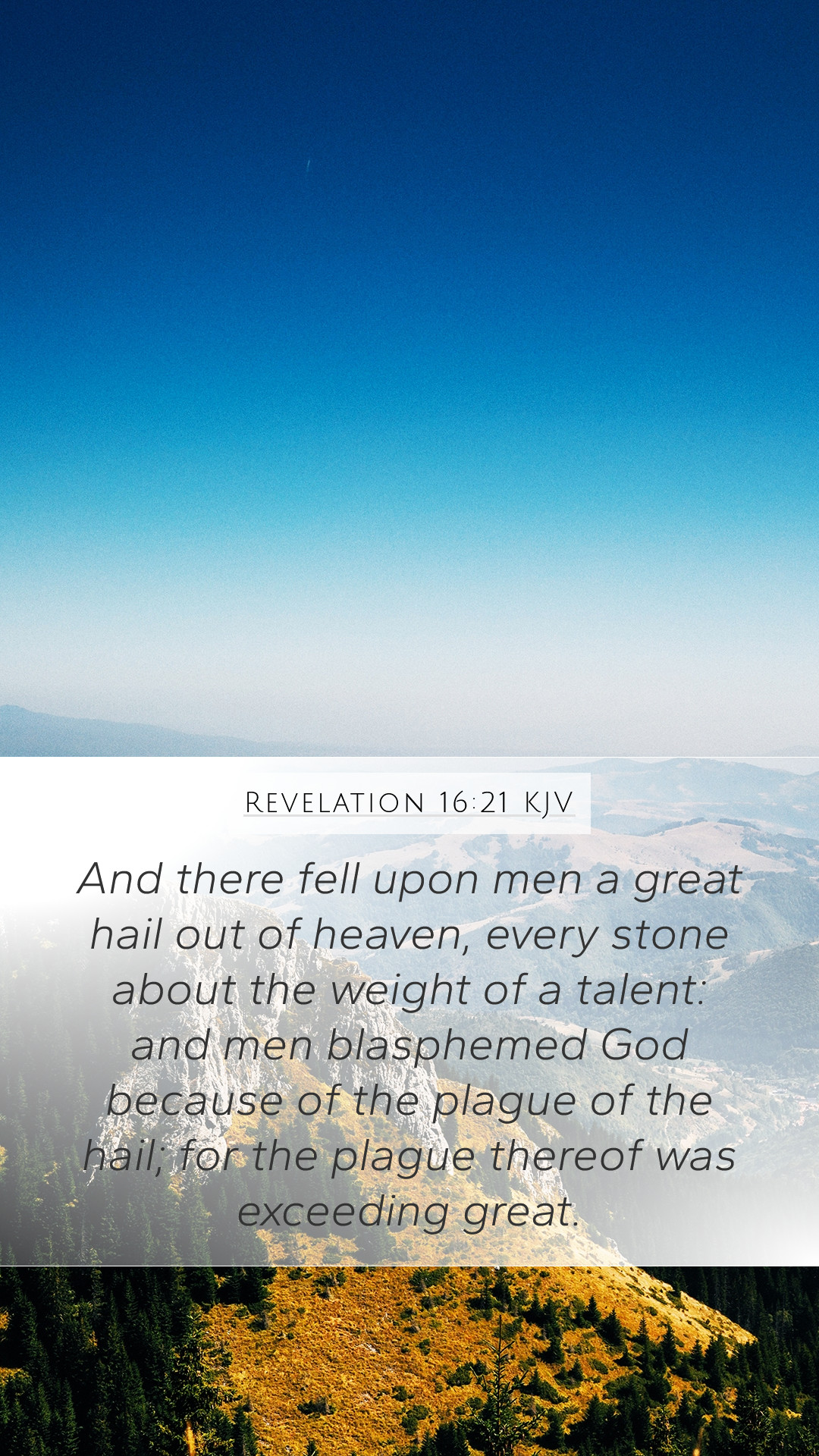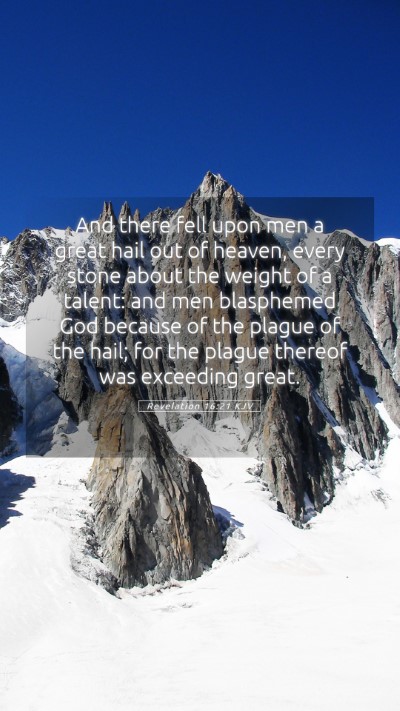Bible Verse Commentary on Revelation 16:21
Verse Text: "And there fell upon men a great hail out of heaven, every stone about the weight of a talent: and men blasphemed God because of the plague of the hail; for the plague thereof was exceeding great."
Meaning and Interpretation
This verse illustrates one of the final judgments depicted in the Book of Revelation, showcasing both the severity of God's relentless justice and the continued defiance of humanity against divine authority. Hailstones of such immense weight, symbolizing judgment, fall upon the unrepentant, leading to blasphemy instead of repentance. The insights provided by various public domain commentaries contribute to a deeper understanding of this scripture.
Insights from Matthew Henry's Commentary
Matthew Henry emphasizes the symbolic nature of the hail as representing God's wrath poured out upon the earth. This event serves as both a punishment for sin and a direct consequence of mankind's persistent rebellion against God. Henry notes that the "weight of a talent" signifies a heavy tribute to the seriousness of sin and judgment. Instead of turning to God in humility, those affected demonstrated a hard-hearted response, showcasing the moral degradation of human beings when faced with divine truth.
Analysis from Albert Barnes
Albert Barnes identifies the hail as part of the broader series of plagues that afflict those who oppose God. He describes the plague of hail as an act that reveals God's omnipotence and judgment against sin. The weight of the hailstones suggests that just as the hail is immensely heavy, so too are the burdens of sin that weigh upon humanity. Barnes points out the contrast between the physical destruction wrought by the hail and the spiritual blindness of the people who instead of repenting, blaspheme God for their suffering.
Commentary by Adam Clarke
Adam Clarke's analysis focuses on the imagery present in this scripture. He posits that the hail represents divine retribution, a recurrent theme in biblical prophecy. Clarke highlights the phrase "they blasphemed God," underscoring the tragic response of a sinful world when confronted with God's judgments. Instead of acknowledging their wrongdoing, mankind's tendency is to rebel further, illustrating the plight of a heart hardened by sin.
Key Themes
- Divine Judgment: The verse starkly highlights God's justice as it is meted out through catastrophic means.
- Human Rebellion: It illustrates the ongoing rebellion of humans against God's will, even in the face of severe consequences.
- Spiritual Blasphemy: Instead of repenting, people continue to blaspheme, indicating a deeper moral and spiritual crisis.
Cross References
- Exodus 9:22-26: The fifth plague in Egypt where hail falls as a punishment.
- Psalms 18:13: References to God’s voices in storms and judgments.
- Isaiah 30:30: A proclamation of God's judgment involving both storms and hail.
- Revelation 8:7: The first trumpet judgment also involves hail and fire.
- Revelation 11:19: The symbolism of the temple and judgment is also present in this verse.
Practical Applications
Understanding Revelation 16:21 serves as a poignant reminder of the consequences of sin and the character of God as a righteous judge. It helps believers reflect on their own lives regarding repentance, humility, and their relationship with God. Recognizing the seriousness of disobedience should prompt a careful examination of how they respond to the trials and tribulations in their lives.
Conclusion
In conclusion, Revelation 16:21 encapsulates a vital biblical theme of judgment, rebellion, and the consequences of estrangement from God. As you study this verse and its implications further, it provides a foundation for understanding biblical exegesis and the necessary response to God’s divine communication through scripture.
Further Study Recommendations
- Engage in Bible study groups to explore different interpretations.
- Utilize online Bible study tools to enhance understanding.
- Read relevant Bible study guides and resources for deeper insight into Revelation.
- Participate in Bible study lessons that focus on apocalyptic literature.


